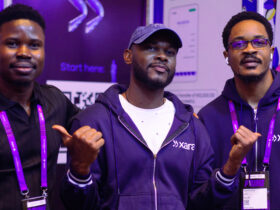Nigeria’s media and entertainment industry to generate $5.8bn by 2029

The Nigerian entertainment and media (E&M) industry is poised for a digital shift, with its total revenue projected to reach $5.8 billion by 2029, according to PwC.
The 14th Edition of PwC’s Entertainment and Media Outlook Report 2025-2029 highlighted that the core drivers of this growth are rooted in Nigeria’s large, youthful and tech-savvy population, who are leveraging technology and GenAI.
“GenAI is emerging as a transformative force in the E&M industry, enhancing content creation, recommendation engines and customer engagement. Nigeria, with its youthful and tech-savvy population, is particularly well-positioned to harness GenAI’s potential for this growth,” the report said.
According to PwC, Nigeria’s rapid expansion is also fuelled by the expansion in internet advertising, video games and e-sports, Over-The-Top (OTT) streaming, and audio content such as music, radio, and podcasts.
“The nation’s media market is rapidly pivoting to digital revenue, with digital advertising set to account for 84% of all ad spend in Nigeria, a figure that exceeds the global average. Moreover, changing consumption habits are creating new market leaders, with the gaming and e-sports segment forecasted to surpass traditional television revenue by 2028,” the report added.
Nigeria’s performance is setting a new standard for resilience and momentum across the continent. While the African E&M sectors include South Africa and Kenya, too, these countries are already outperforming global growth benchmarks with Nigeria as the undisputed leader.
In 2024, the nation recorded a remarkable 11.2% growth rate, surpassing Kenya’s 7.1% and South Africa’s 6.2%. This trajectory is expected to continue, with Nigeria maintaining the region’s highest projected Compound Annual Growth Rate (CAGR) of 7.2% through 2029, a figure that signals sustained and aggressive expansion across the market.
Read also: Nigeria’s crypto transactions hit record N75 trillion in one year amid capital market apathy
The growth in gaming and esports in Nigeria
According to PwC, Gaming and esports are on track to overtake traditional television globally by 2029, driven by the rapid expansion of mobile platforms, broader internet access and the rise of immersive technologies like virtual and augmented reality.
“These shifts are fuelling deeper engagement and higher spend, particularly among a younger, digitally native audience who favour interactive and personalised experiences over passive viewing. Nigeria emulates this global trend, but one year earlier, with gaming and esports taking the lead in 2028,” the report said.
Globally, OTT subscription revenue is also forecast to exceed traditional television subscription revenue in 2027. Beyond macroeconomic factors, another key reason for the slowdown in consumer spending is the increasing need for digital access.
Connectivity is defined as revenue from fixed and mobile internet services. It remains the largest segment of the E&M industry, driven largely by mobile services. Spending on connectivity is projected to exceed $1.3 billion by 2029, underscoring its foundational role in the digital economy.
Read also: Digital banking: How Nigerian banks and fintechs are driving financial inclusion

The growth in internet access in Nigeria
Internet access is also predominantly mobile, with most users connecting through mobile networks amid ongoing 4G expansion and nascent 5G trials. Starting from a relatively modest level in 2024, Nigeria boasts of over 142 million internet users. Data consumption is projected to more than triple, growing at a CAGR of 25.4% to reach 58.2k petabytes (PB) by 2029.
According to PwC, Wi-Fi networks will continue to dominate data usage, with their share of total traffic increasing from 65.2% in 2024 to 73.1% in 2029. This is driven by the wider availability of affordable and free hotspot access points.
“Wi-Fi traffic is projected to grow at a CAGR of 28.3%, tripling over the forecast period. Cellular data traffic is also expected to more than double, reaching 11.6k petabytes (PB) by 2029,” the report says.

A future shaped by digitalisation and AI in Nigeria
While Nigeria’s E&M sector is showing explosive growth, it is expanding within a complex and changing global environment.
The worldwide Entertainment and Media sector is undergoing a massive shift, sitting right where new technology meets changes in what consumers want. Globally, online advertising is now the main powerhouse of revenue, growing much faster than money spent directly by consumers.
By 2029, global ad revenue is actually expected to exceed consumer spending by more than $300 billion. The gap is huge: advertising is projected to grow at a compound annual rate of 6.1%, while consumer spending lags far behind at only 2.0%. This mirrors the trend you see in Nigeria, where digital advertising will account for a massive 84% of local ad spend.
New technologies like Artificial Intelligence (AI) are also playing a crucial role worldwide. AI is ready to transform the E&M industry, especially in advertising, where it makes campaigns both more creative and more efficient.
Furthermore, how different generations, especially the young, consume media, particularly when it comes to gaming, is reshaping the entire industry and creating new market leaders.
Despite all this innovation and the great value being unlocked, the global economy faces major challenges that could slow down overall growth. Regulators are introducing new rules and tariffs that create obstacles for expansion.
Most importantly, it’s becoming harder to convince consumers to spend more of their money on media and entertainment products, especially given the current pressures from economic uncertainty and inflation. This means that even with exciting technology like AI, the rate of overall global revenue growth is expected to decline throughout the forecast period due to these constraints on consumer spending.
Read also: Generative AI in Nigerian education: Can technology bridge the country’s learning divide?







